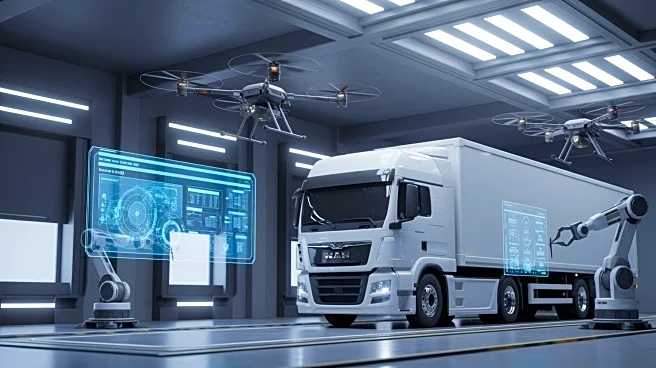What's Happening?
Trucking logistics companies are examining various business models to improve efficiency and profitability in the freight transportation sector. The industry, which moves 72.6% of the country's freight by
weight, faces high costs including fuel, maintenance, and driver wages. Companies are adopting models such as third-party logistics providers (3PLs) and freight brokers to streamline operations. 3PLs manage multiple supply chain elements, while freight brokers act as intermediaries between shippers and logistics companies. The freight brokerage model includes the Cradle to Grave (C2G) and Chicago (buy/sell) models, each with distinct operational strategies. Additionally, digital and hybrid models are gaining traction, offering online services and combining various operational strategies for enhanced efficiency.
Why It's Important?
The exploration of diverse business models in trucking logistics is crucial for maintaining competitive advantage and profitability in a high-cost industry. Efficient logistics operations can significantly reduce expenses and improve service delivery, benefiting both companies and their clients. As logistics companies optimize their operations, they can offer more reliable and cost-effective services, which is vital for industries relying on timely and safe freight transportation. The adoption of technology and innovative business models can lead to improved tracking, customer service, and operational control, ultimately enhancing the overall supply chain efficiency.
What's Next?
Trucking logistics companies are likely to continue refining their business models to adapt to changing market demands and technological advancements. The integration of digital solutions and real-time tracking systems will play a significant role in shaping the future of logistics operations. Companies may also explore partnerships and collaborations to expand their service offerings and reach. As the industry evolves, stakeholders will need to focus on sustainability and regulatory compliance to ensure long-term success.
Beyond the Headlines
The shift towards more efficient business models in trucking logistics may lead to broader implications for the industry, including increased focus on sustainability and environmental impact. As companies seek to reduce costs, there may be a push towards greener technologies and practices. Additionally, the evolution of logistics models could influence labor dynamics, with potential changes in workforce requirements and training needs.









